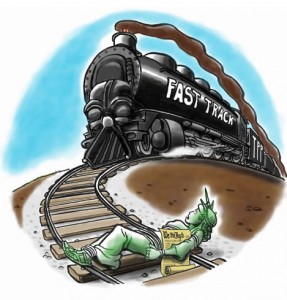NATIONAL
Bipartisan opposition to ‘fast track’ on trade
WASHINGTON, D.C. (Nov. 21, 2013) — Reps. Rosa DeLauro (D-Conn.) and George Miller (D-Calif.) wrote a letter to President Barack Obama, signed by 149 other House Democrats, opposing renewing the traditional model of “Fast Track” trade promotion authority for the Trans Pacific Partnership (TPP) or any other future trade deals. The letter expresses concerns that the procedure undemocratically denies Congress its rightful role in foreign policy and ignores congressional prerogatives to make policy on a host of other issues, such as labor, finance, health care and energy policy.
 Rep. Jim McDermott (D-Seattle) was the only member of Washington’s Congressional delegation to sign the letter.
Rep. Jim McDermott (D-Seattle) was the only member of Washington’s Congressional delegation to sign the letter.
Led by Rep. Walter Jones (R-N.C.), 23 Republican House members also issued a letter opposing Fast Track. None of the signers were from Washington state.
Traditional Fast Track authority has allowed a president to submit trade deals to Congress without allowing adequate opportunity for input from most members of Congress. It also denies opportunities to amend the deal or its implementing legislation. International trade agreements often touch on many different issues and when Fast Track has been in place in the past, most committees whose issue areas are affected by a particular trade deal have not had sufficient opportunities to provide meaningful input in the negotiating process or a chance to object to the application of Fast Track to a particular trade deal when it fails to meet congressional policy goals. The letter emphasizes the importance of a new, inclusive and 21st century model for trade agreement negotiation by listing some of the many policy issues that can be affected by trade deals:
Labor, patent and copyright, land use, food, agriculture and product standards, natural resources, the environment, professional licensing, competition, state-owned enterprises and government procurement policies, as well as financial, health care, energy, e-commerce, telecommunications and other service-sector regulations.
In a recent legislative alert, AFL-CIO Director of Governmental Affairs Bill Samuel affirmed the AFL-CIO’s agreement with the DeLauro-Miller letter:
We share the concerns of Representatives DeLauro and Miller as outlined in their letter. The time to overhaul the United States trade negotiating system is long overdue. Over the past several decades, free trade agreements have fueled the profits of companies that have outsourced, but they have suppressed American workers’ wages and their standard of living.
Proponents of such trade deals argue that they boost the U.S. economy, but the evidence points in the other direction. As Public Citizen recently noted:
In contrast to Obama’s promises that the Korea deal would boost exports, in the agreement’s first year U.S. exports to Korea fell 10 percent, imports from Korea rose, and the U.S. trade deficit with Korea exploded by 37 percent. This equates to a net loss of approximately 40,000 U.S. jobs.
Granting old-style Fast Track now could ease the passage of trade deals such as the TPP, Trans-Atlantic Trade and Investment Partnership and the Trade in International Services Agreement without adequate congressional input and oversight. Workers can’t afford any more bad trade deals. The AFL-CIO believes it is time for a new model of trade negotiation authority, just as it is time for a new model of trade deal.
Anything less leaves America’s working families behind.
For more information, visit Public Citizen’s Fast Track page.
AFL-CIO Now contributed to this report.





